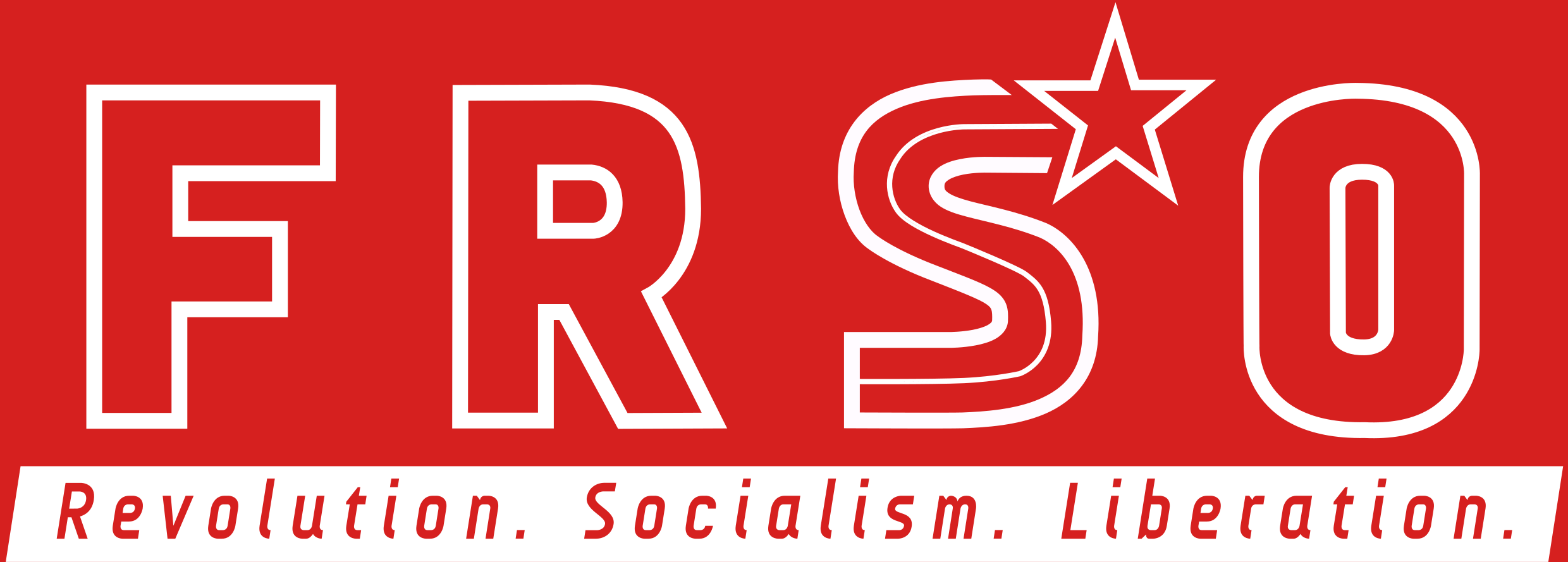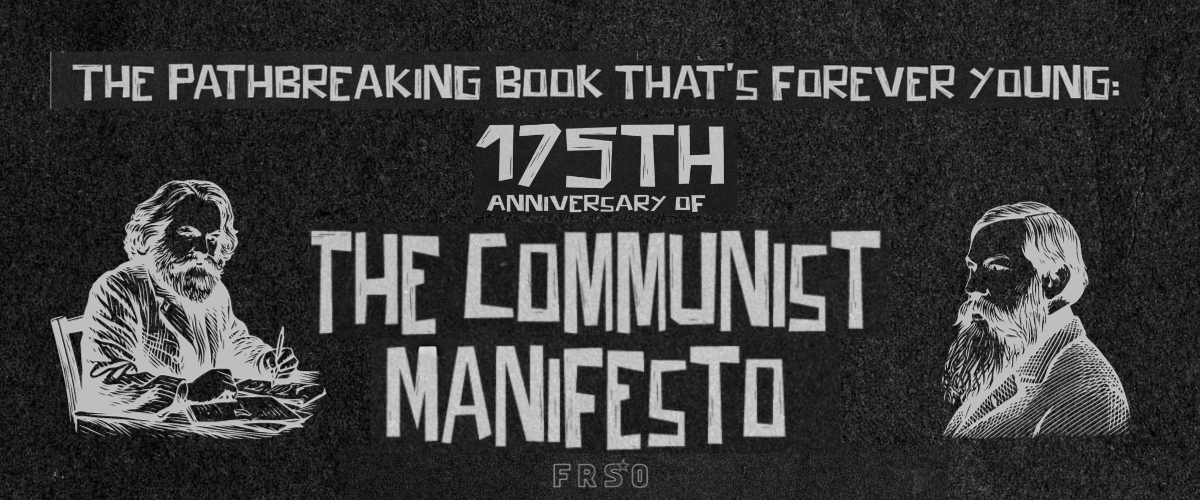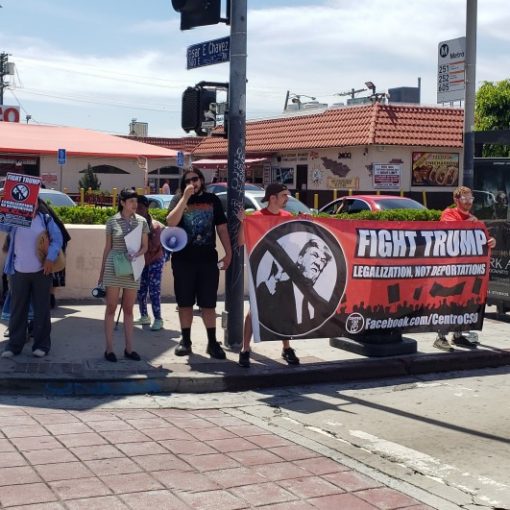The following text was present by Mick Kelly, The political secretary of Freedom Road Socialist Organization at a webinar organized by the People’s Resource for International Solidarity and Mass Mobilization (PRISM) and the International League of People’s Struggle (ILPS) to mark the 175th anniversary of “The Communist Manifesto.”
Comrades and friends,
Let me begin by thanking the organizers of this important event, the People’s Resource for International Solidarity and Mass Mobilization (PRISM) and the International League of People’s Struggle (ILPS) for today’s opportunity to learn from each other and share our respective views, as we mark the birth of The Communist Manifesto.
Before speaking about this, note should be made of another important anniversary. December 16 marks one year since the passing of a truly great proletarian revolutionary and outstanding Marxist-Leninist, Jose Maria Sison. Comrade Sison’s great contributions to the struggle and his rich theoretical legacy have an international significance. Ka Joma lives in the collective fight we are waging for new world free of imperialism and exploitation!
175 years young
The Communist Manifesto was first published in February of 1848, so that is more than a few years ago, but the work itself remains remarkably vital and relevant. Not all books stand the test of time. The Manifesto of the Communist Party does – it continues to animate the thinking and practice of revolutionaries around the globe.
The authors of The Communist Manifesto, Karl Marx and Fredrick Engels, were under 30 years old when this pathbreaking work was first published. In 1848, it represented new thinking of a emerging and ascending class, the proletariat, the modern working class that was starting to act independently – a class in itself developing a movement for itself.
The Communist Manifesto was at once a call to arms and a work of science. It expounds on the basic premises of historical materialism, including the importance of the development of the productive forces, the relationships of production, and resulting struggle between classes and their political representatives.
Written at a time when a wave of revolutionary struggle was unfolding in Europe, The Communist Manifesto concludes with this stirring declaration, “The Communists disdain to conceal their views and aims. They openly declare that their ends can be attained only by the forcible overthrow of all existing social conditions. Let the ruling classes tremble at a Communistic revolution. The proletarians have nothing to lose but their chains. They have a world to win.”
For those of us who hate oppression and want to end it, what’s not to like about this straightforward declaration of war on capitalism? It rang true then and it rings true now.
Classes and class struggle
Class struggle is a fundamental theme of The Communist Manifesto that has extraordinary relevance to the conditions we are facing in the U.S. today. The developing competitive capitalism described with clarity by Marx and Engels arrived at a new stage, that of monopoly capitalism, a failed and moribund system. The decline of U.S. monopoly capitalism and the empire it created is accelerating, or to put it another way, the decline of U.S. imperialism is speeding up, and as it descends, every contradiction in U.S. society, including those with in the ruling class, are sharpening.
Mention here should be made of the world-shaking events in Palestine, where a heroic resistance movement is successfully confronting the Israeli occupation – and layered on top of this is the U.S.-backed genocide underway in Gaza. In the midst of these developments, the limits of U.S. power stand in stark relief. The resistance in Lebanon is pummeling the Zionists and ignoring U.S threats. The same goes for the armed forces of Yemen, who are striking ships heading for Israel. The U.S. tells the axis of resistance to stop fighting for liberation, but no one is listening at all.
The results of the accelerating decline can be seen everywhere in the economic and political landscape of the U.S. today. There is no consensus in the U.S ruling class and among its political representatives on how to maintain U.S. empire. The deeply unpopular President Joe Biden and the irrational Donald Trump stand as symptoms of a sick society, one that’s place in the world is growing ever smaller.
The standard of living for the U.S. working class is declining. National oppression, the systematic inequality visited upon African Americans, Chicano and Latinos, Asian Americans, indigenous peoples, and others, is intensifying. Democratic rights in general are under attack. The upshot is rising tide of resistance.
In The Communist Manifesto, Marx speaks of history being the history of class struggle, as well as the content of the present. In the U.S. today there is marked uptick in the level of class struggle, such as the protected and successful strike waged by the auto workers. It’s in this context we see a new openness to militant, class-struggle trade unionism.
The vast uprising following the murder of George Floyd represented a turning point in U.S. history. Involving tens of millions of people, the George Floyd uprising was a political experience that impacted the political understanding of an entire layer of society.
Members of Freedom Road Socialist Organization have been activists, leaders and builders of this growing tide of struggle. For example, through the mass organizations we are active in, we were able to play a significant role in the George Floyd rebellion. The growing polarization in U.S. society will be a test for our organization, a challenge we are determined to meet.
Reform and revolution
In every struggle, FRSO works to carry out three objectives. First, we want to win all that can be won and land the heaviest blows possible. Second, we work to raise the general level of consciousness and organization of the masses of people. Finally, we are trying to win the advanced, those who have stepped forward as activists and organizers, to Marxism-Leninism, thus building communist organization.
Marx and Engels are crystal clear in The Communist Manifesto about the need to fight for reforms, and the need to fight for immediate demands, such as free education, is talked about. There is also clarity about the need to represent the future, i.e. the need for proletarian political power – socialism – in the present.
There is a dialectical relationship between the fight for reforms and revolutionary change. Interacting with reality and fighting for what people want in the here and now is how people learn about the enemy and the capitalist system. Communists working shoulder to shoulder with the advanced is a way we accumulate forces and build communist organization. We don’t need a talking shops; we need revolutionary organization that has the capacity to think as it fights.
Marx and Engels are clear that socialism is much more that than an accumulation or extension of reforms. The point is made in the Manifesto that a radical rupture with existing property relations is needed, and a break with old ideas.
Lenin in the book The State and Revolution has an important discussion of this point, when he states,
“The only “correction” Marx thought it necessary to make to The Communist Manifesto he made on the basis of the revolutionary experience of the Paris Commune.
“The last preface to the new German edition of The Communist Manifesto, signed by both its authors, is dated June 24, 1872. In this preface the authors, Karl Marx and Frederick Engels, say that the programme of The Communist Manifesto “has in some details become out-of-date”, and the go on to say: “… One thing especially was proved by the Commune, viz., that ‘the working class cannot simply lay hold of the ready-made state machinery and wield it for its own purposes’….”
Lenin goes on to say, “Thus, Marx and Engels regarded one principal and fundamental lesson of the Paris Commune as being of such enormous importance that they introduced it as an important correction into The Communist Manifesto.”
To put this another way, dictatorship of the capitalists needs to be smashed to atoms and replaced with the dictatorship of the proletariat.
Need of a communist party
In the Manifesto, Marx and Engels speak of the need for a proletarian conquest of political power. This is impossible without a communist party that’s armed with the science of Marxism-Leninism, that applies the mass line, and has close ties with the masses of people.
While we in Freedom Road Socialist Organization do play an important role in many struggles, at times mobilizing tens of thousands of people, we are not yet a communist party. We are building such a thing, but we are not there yet.
We think that a communist party that is a real communist party, a party of the working class and oppressed in deeds not words, needs to fuse Marxism-Leninism with the workers’ movement, and in that process incorporate a meaningful section of the advanced the activists, organizers and leaders into communist organization.
There is something silly about saying one is the party of the working class when they are not known to most workers. We need to learn as we teach, and it is important that communists are standing in the forefront of actually existing workers’ movement.
Every serious communist organization need to fight against opportunism, and The Communist Manifesto devotes considerable attention to doing exactly that in a rigorous and scientific way that all of us can learn from.
Conclusion
The current period is favorable one for communists to advance in a big way. In addition to being embedded in the popular struggles, we need to do like Marx said and disdain to conceal our aims. In the U.S. a growing number of people, especially young people, are looking for alternatives to capitalism, and many are reading the book we are discussing today – The Communist Manifesto. By grasping the Manifesto’s main lessons and points, we are picking up a powerful weapon for change. Whether it was in Russia, China, Korea, and so many more places, those that led the struggle for socialism read The Communist Manifesto and put the theory into practice. A bright future awaits all communists who do exactly that.





